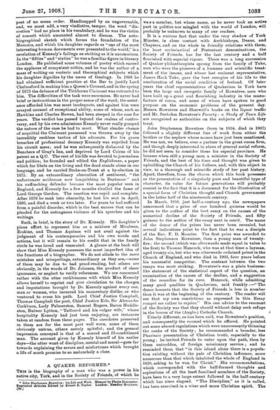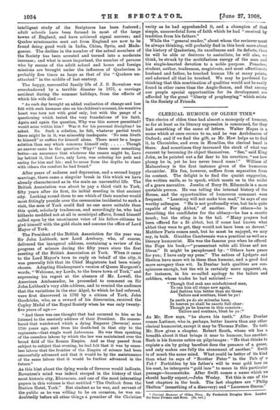A QUAKER REFORMER.*
This is the biography of a man who was a power in his native city, York, and in the Society of Friends, of which be • John Stsphenson Bowntre. : his Life and Work. Memoir. by Phebe Doncaster. Reprinted Articles Edited by Ernest E. Taylor. London: Headley Brothers. 16s.J
was a member, but whose name, as he never took an active part in politics nor mingled with the world of London, will probably be unknown to many of our readers.
It is a curious fact that under the very shadow of York Minster, in close contact with Archbishops, Deans, and Chapters, and on the whole in friendly relations with them, the least ecclesiastical of Protestant denominations, the Society of Friends, has for the last century and a half flourished with especial vigour. There was a long succession of Quaker philanthropists sprung from the family of Take, men who were the pioneers of a humane and scientific treat- ment of the insane, and whose last eminent representative, James Hack Take. gave the best energies of his life to the amelioration of the social condition of Ireland. Of later years the chief representatives of Quakerism in York have
been the large and energetic family of Rowntree, men who have built up a great and flourishing industry in the MAIM*
facture of cocoa, and some of whom have spoken to good purpose on the economic problems of the present day. Messrs. Rowntree and Sherwell's books on the liquor traffic
and Mr. Seebohm Rowntree's Poverty : a Study of Town Life are recognised as authorities on the subjects of which they treat.
John Stephenson Rowntree (born in 1834, died in 1907) followed a slightly different line of work from either the brother or the nephew whose names have just been mentioned.
He was not, we believe, ever a partner in the great cocoa firm, and though deeply interested in plans of general social reform,
he did not seem to consider these his especial province. He
became when still a young man a minister in the Society of Friends, and the best of his time and thought was given tb upbuilding the Church of his fathers, and, with this object in view, to a thorough and scientific study of her past history. Apart, therefore, from the charm which this book possesses as the presentation of a singularly pure and beautiful type of character, its value for future generations will probably consist in time fact that it is a document for the illustration of a special form of Christian thought and Church government in the latter half of the nineteenth century.
In March, 1858, just half-a-century ago, the newspapers announced that a prize of one hundred guineas would be given to time author of the best essay on the causes of the numerical decline of the Society of Friends, and fifty guineas to the author of the essay next in merit. The name of the donor of the prizes has never been revealed, but several indications point to the fact that he was a disciple of time Rev. F. D. Maurice. The first prize was awarded to John Stephenson Rowntree, then a young man of twenty- five ; the second (which was afterwards made equal in value to the first) to Thomas Hancock, who was at that time a layman, aged twenty-six, but who was afterwards ordained priest in the Church of England, and who died in 1903, four years before his successful competitor. The contrast between the two essays was most striking. Rowntree's was a plain business- like statement of the statistical aspect of the question, an examination of the causes of the decline, and a suggestion of the remedies for its cure. Hancock, while admitting many good qualities in Quakerism, said frankly :—" The donor laments that the Society of Friends is lees in number than it was at the beginning of the century. The reader will see that my own convictions as expressed in this Essay compel me rather to rejoice." His one advice to the remnant of the Society was that they should without delay seek refuge in the bosom of the (Anglo-) Catholic Church.
Utterly different, as has been said, was Rowntree's position. and consequently the counsel which he offered. He pointed out some absurd regulations which were unnecessarily thinning the ranks of the Society ; he recommended a broader, less Pharisaic presentation of Christian truth, especially to the young ; he intited Friends to enter upon the path, then by them untrodden, of foreign missionary service ; and he reminded them that "in this island alone there is a popula- tion existing without the pale of Christian influence, more numerous than that which inhabited the whole of England in 16,50, asking to be won for Christ." His recommendations,
which corresponded with the half-formed thoughts and aspirations of all the least fossilised members of the Society, have been to a very large extent followed in the half-century which has since elapsed. "The Discipline," as it is called, has been exercised in a wiser and more Christian spirit. The intelligent study of the Scriptures has been fostered ; adult schools have been formed in most of the large towns of England, and have achieved signal success; and Quaker missionaries sent out from England are now to be found doing good work in India, China, Syria, and Mada- gascar. The decline in the number of the actual members of the Society has been arrested and turned into a moderate increase ; and what is more important, the number of persons who by means of the adult school and home and foreign missions are brought under the influence of Quakerism is probably five times as large as that of the "Quakers un- attached" in the middle of last century.
The happy, uneventful family life of J. S. Rowntree was overshadowed by a terrible disaster in 1875, a carriage accident during the summer holidays, from the effects of which his wife died :— " As each day brought an added realisation of change and loss felt with such keenness also on his children's account, his sensitive heart was torn not with grief only, but with the pangs of a questioning which tested the very foundations of his faith.
• Again and again the question, Why was this sorrow permitted? would arise within him ? Was it for his personal discipline ? he asked. No. Such a solution, he felt, whatever partial truth there might be in it, was miserably inadequate. 'No man liveth to himself' or suffers for himself alone. There must be a larger solution than any which concerns himself only Though no answer came to the question ' Why ? ' there came something better—an assurance that whatever the reason might be, Love lay behind it, that Love, only Love, was ordering his path and caring for him and his : and he arose from the depths to share with others the comfort he had found."
After years of sadness and depression, and a second happy marriage, there came a singular break in this which we have already characterised as in the main an uneventful life. The British Association was about to pay a third visit to York, fifty years after its first, its initial meeting in that ancient city. Looking round them to see which of their number would most fittingly preside over the ceremonies incidental to such a visit, the men of York could find no one more suitable than this quiet, scholarly tradesman, and accordingly he, who had hitherto meddled not at all in municipal affairs, found himself called upon by the unanimous voice of his fellow-citizens to gird himself with the gold chain and assume the office of Lord Mayor of York.
The President of the British Association for the year was Sir John Lubbock, now Lord Avebury, who, of course, delivered the inaugural address, containing a review of the progress of science during the fifty years since the first meeting of the British Association at York. When it came to the Lord Mayor's turn to reply on behalf of the city, it was generally felt that its Chief Magistrate had been wisely chosen. Adopting Shakespeare's version of Queen Margaret's words, "Welcome, my Lords, to the brave town of York," and expressing his regret at the absence of Mr. Lowell, the American Ambassador, he proceeded to comment on Sir John Lubbock's very able address, and to remind the audience that the variations in the star Algol, to which he had referred, were first discovered in 1782 by a citizen of York, John Goodricke, who, as a reward of his discoveries, received the Copley Medal of the Royal Society when he was only twenty- five years of age :—
"And there was one thought that had occurred to him as he listened to the masterly address of their President. He remem- bered that watchword which a dying Emperor [Severna] some 1700 years ago, sent from his death-bed in that city to the regiments—that single word Laboremus. He was then speaking of the ceaseless labour by which the law was maintained over the broad field of the Roman Empire. And as they passed from subject to subject that evening, he had felt that it was by cease- less labour that the frontier of the Empire of science had been successfully advanced and that it would be by the maintenance of the same labour that it would be further advanced in the future."
As this hint about the dying words of Severna would indicate, Rowntree's mind was indeed steeped in the history of that most historic city, Eburacum, and one of the most interesting papers in this volume is that entitled "The Outlook from the Station Hotel, York." But student as he was, and servant of the public as he was willing to be on occasion, he was un- doubtedly before all other things a preacher of the Christian
verity as he had apprehended it, and a champion of that simple, unsacerdotal form of faith which he had "received by tradition from his fathers."
While the "general reader," about whom the reviewer must be always thinking, will probably find in this book more about the history of Quakerism, its excellences and its defects, than he will be able or desirous to assimilate, he will also, we think, be struck by the multifarious energy of the man and his single-hearted devotion to a noble ,purpose. Preacher, student, author, tradesman, magistrate, and most affectionate husband and father, he touched human life at many points, and adorned all that he touched. We may be pardoned for thinking that this combination of qualities would not be easily found in other races than the Anglo-Saxon, and that among our people special opportunities for its development are afforded by the great "liberty of prophesying" which exists in the Society of Friends.























































 Previous page
Previous page